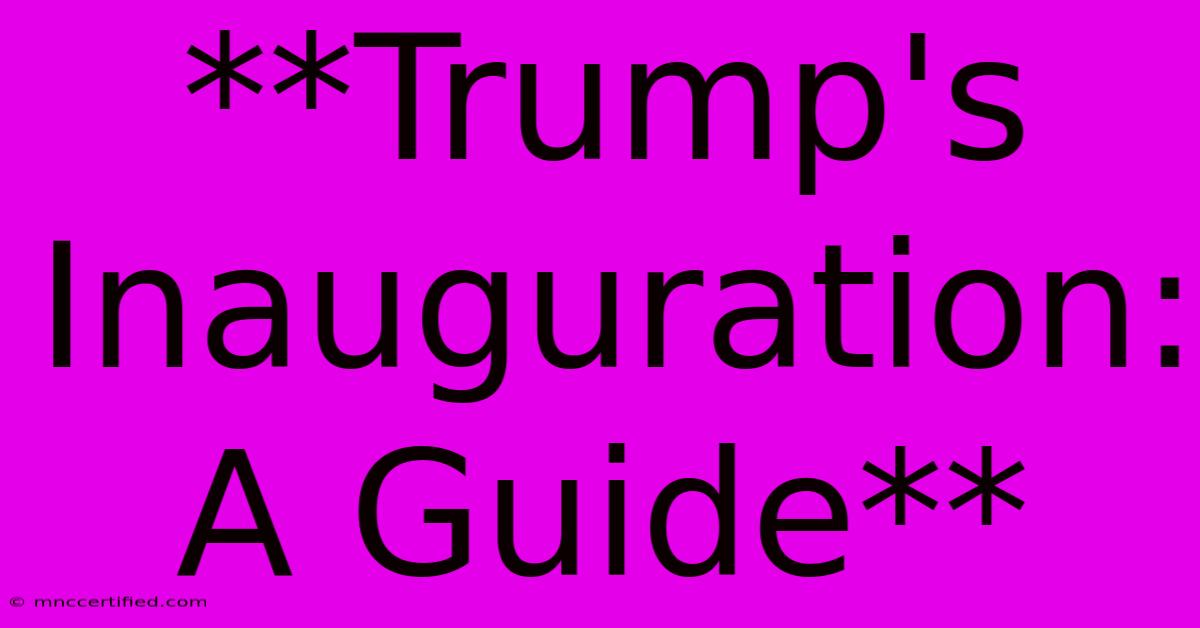**Trump's Inauguration: A Guide**

Table of Contents
Trump's Inauguration: A Guide to Understanding This Historical Moment
Donald Trump's inauguration as the 45th President of the United States on January 20, 2017, was a momentous event that sparked both celebration and controversy. Whether you're interested in understanding the historical context, the key moments, or the lasting impact of this day, this comprehensive guide will provide the information you need.
The Historical Context: A Nation Divided
Trump's election victory came after a highly divisive and polarizing campaign. His populist rhetoric and promises of change resonated with many Americans who felt left behind by the economic and social changes of the 21st century. However, his rhetoric also fueled fears of discrimination, xenophobia, and authoritarianism among others.
The inauguration itself was seen as a symbol of this division, with record-breaking protests taking place across the country. This event underscored the deep political and social rifts that had emerged in American society.
Key Moments of the Inauguration: A Day of Speeches and Symbolism
Trump's inauguration ceremony was held at the United States Capitol Building in Washington D.C. Here are some of the key moments:
- The Oath of Office: Trump took the oath of office, officially assuming the presidency. This moment was witnessed by millions of Americans watching live on television and online.
- Trump's Inaugural Address: Trump delivered a speech outlining his vision for the country. His address focused on themes of "American carnage," "putting America first," and "draining the swamp."
- The Inaugural Parade: Following the ceremony, Trump participated in a parade down Pennsylvania Avenue, showcasing the pomp and ceremony of the inauguration.
The Lasting Impact: A Legacy Still Unfolding
The 2017 inauguration marked the beginning of a presidency that would be defined by constant controversy, political turmoil, and a focus on "America First" policies. Trump's presidency had a significant impact on:
- Immigration Policy: Trump implemented strict immigration policies, including a travel ban on citizens from several Muslim-majority countries.
- Foreign Policy: He pursued a "America First" foreign policy, withdrawing from international agreements and engaging in trade wars with China and other countries.
- Domestic Policy: He enacted major tax cuts and appointed conservative judges to the Supreme Court.
The legacy of Trump's presidency is still being debated today. Some argue that he represented a break from traditional American politics, while others criticize his divisive rhetoric and policies.
Understanding the Significance: A Turning Point in American History
Trump's inauguration was a pivotal moment in American history. It reflected the nation's deep divisions and set the stage for a turbulent and consequential presidency. By studying the historical context, key moments, and lasting impact of this event, we can gain a deeper understanding of contemporary American politics and society.
Further Resources:
- National Archives and Records Administration:
- The Presidential Inaugural Committee:
- The New York Times:
This comprehensive guide provides a starting point for understanding Trump's inauguration and its enduring significance. By exploring the historical context, key moments, and lasting impact, you can gain a more nuanced and informed perspective on this defining event in American history.

Thank you for visiting our website wich cover about **Trump's Inauguration: A Guide**. We hope the information provided has been useful to you. Feel free to contact us if you have any questions or need further assistance. See you next time and dont miss to bookmark.
Featured Posts
-
Red Star Vs Barcelona Matchday Preview And Analysis
Nov 07, 2024
-
Will Insurance Pay More Than Policy Limits
Nov 07, 2024
-
1 0 Club Brugge Victorious Against Aston Villa
Nov 07, 2024
-
Bitcoin Price Jumps After Trump Tweet
Nov 07, 2024
-
Musiala We Knew We Had To Win Vs Benfica
Nov 07, 2024